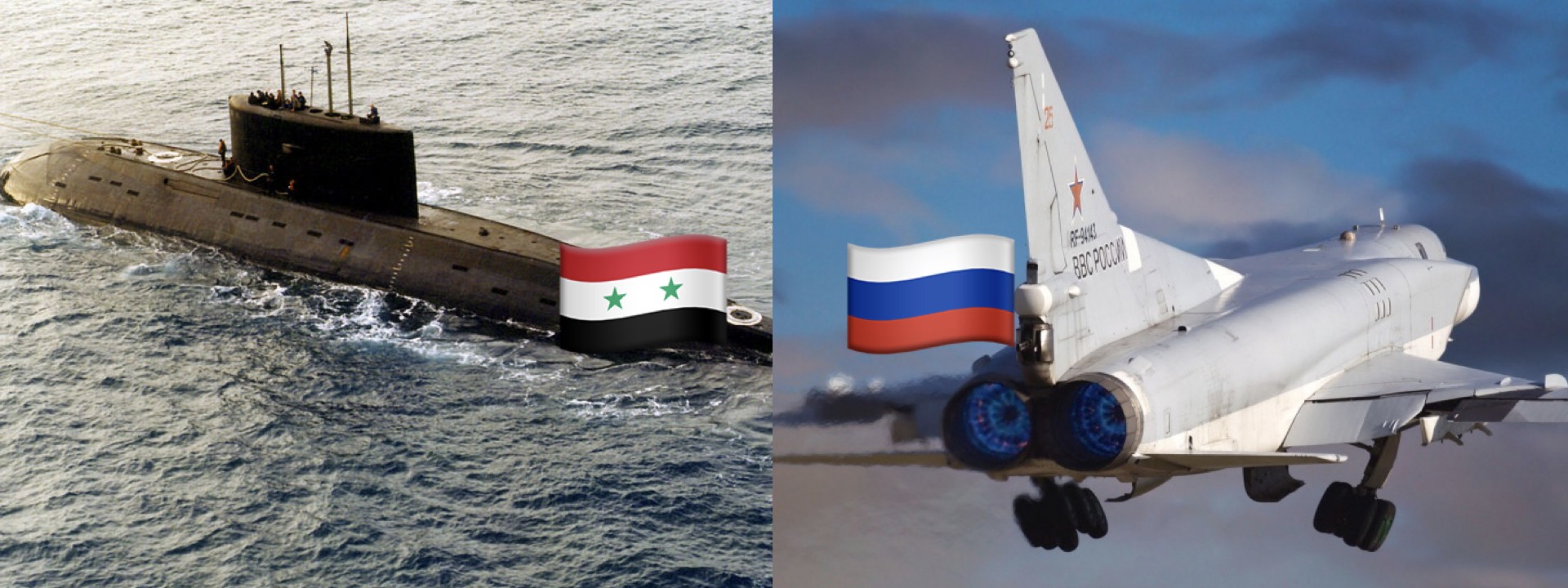#PutinAtWar: Russian Missiles, Syrian Skies
A closer look into Russia’s military launches in Syria
#PutinAtWar: Russian Missiles, Syrian Skies

A closer look into Russia’s military launches in Syria

Russia firmly established its presence in Syria and is not planning to back down from its last remaining military ally not sharing an immediate Russian border anytime soon. On November 3, the Russian Ministry of Defense (MoD) reported airstrikes against ISIS positions in the vicinity of Abu Kamal. @DFRLab uncovered the latest details on Russia’s military operation in Syria.
Overview
Russian defense officials reported six Tu-22M3 strategic bombers and six Kalibr sea-based cruise missiles hit terrorist strongholds, armament, ammunition depots, and important command centers. This was the last day of a three day-long operation designed to pave way for Syrian government forces loyal to Bashar al-Assad and push out ISIS remnants from the area along the Euphrates River in eastern Syria. The Russian MoD provided a video, which also appeared in Russian media, but provided limited information about the operation.
Here is a general overview:
Kalibr Strikes
Russian submarines Kolpino and Veliky Novgorod entered the Mediterranean Sea on August 28, 2017. The Kilo class submarines were equipped with Kalibr family missiles. There are well over a dozen different variants of Kalibr missiles, which vary in launch platform, range, target profile, and speed. Each variant packs a 450-kilogram warhead or a nuclear payload. The land attack variants, the 3M14T and 3M14K (NATO call sign: SS-N-30A), have a range of 2000 kilometres.

The Russian MoD stated six of Kalibr missiles were launched on November 3, and hit critical ISIS infrastructure ahead of an advance by Syrian government forces. In video published by the Russian MoD, we can see six missiles launched from the Russian Kolpino submarine.

The Kalibr missiles are considered to be precision guided missiles, with technical specifications similar to U.S. Tomahawk missiles. Using Russian drone footage, we took a deeper look into Russian target locations. All of the strikes seen in the video were made in the vicinity of Abu Kamal, a small Syrian town next to the border with Iraq. With limited video footage, we were able to geolocate three strikes.

One of the Kalibr strikes took out a building north of Abu Kamal.

The second Kalibr strike was launched to take out a warehouse type building southwest of Abu Kamal.

The third strike took out a building complex in the southeastern part of Abu Kamal.

The Russian MoD did not specify what ISIS utilized each building for, but the precision Kalibr strikes can be justified as reasonable means in urban areas where the risk of collateral damage is significant.
Tu-22M3 Strikes
According to the statement of Russian MoD, six Tu-22M3 long-range bombers were also used to inflict damage on ISIS positions. The video provides very little information on what targets the bombers actually hit, except for specific Euphrates river bends in the background. These bends suggest the bombs were also dropped in the region around Abu Kamal.

Each Tu-22M3 dropped six aerial bombs. Only two long-range bombers were included in the video, thus the targets of the four other bombers remain unknown.

Local media and outlets friendly to the Assad regime did not provide any additional video footage of the operation. One video surfaced on Russian Facebook alternative VKontakte (VK), which allegedly showed the actual bombing of Abu Kamal. The video showed aerial bombing of a town with similarities to Abu Kamal. The bombing itself is sporadic and people can be seen fleeing in panic. The dust clouds from the bombs are also similar in number to the bombs dropped by the Russian bombers. Nonetheless, the actual date of the video footage was not confirmed.
Conclusions
Russian Military remains highly involved with fighting throughout in Syria. The November 3 operation is just one of many carried out since Russia’s involvement increased in 2015. Even though no confirmed videos surfaced from the ground around Abu Kamal, the very use of long-range bombers in urban areas is alarming. This Russian bombing operation supported the advancing Syrian army troops, who finally liberated town of Abu Kemal on November 9.
Follow along for more in-depth analysis from our #DigitalSherlocks.

